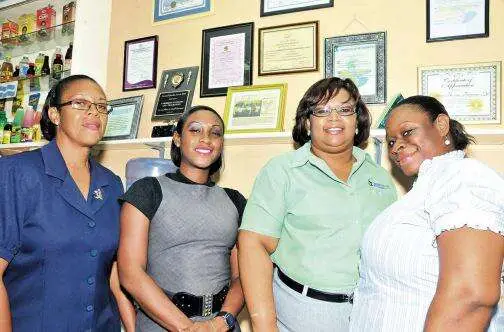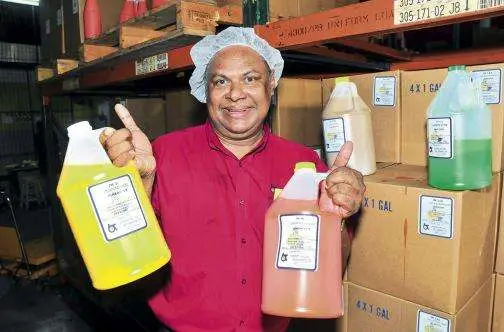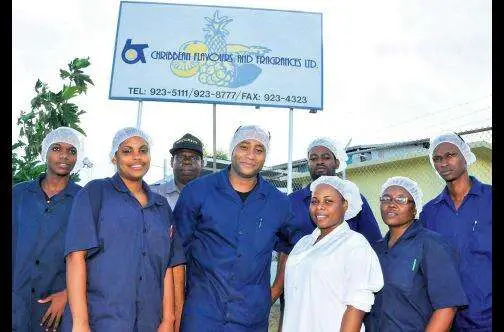
That amazing climb by anand james
(This is the first in a series on people who were born outside of Jamaica and who have not only made this land their home, but have succeeded in their personal pursuits and have also helped to make the nation better)
WHEN History and English Language master Anand James left his native Guyana in August 1983 hoping to land a teaching job in Jamaica, little did he know that he would be running a successful, publicly listed company today.
James, then 32, packed his bags and headed off with wife of nine years, Joan, with the objective of filling two of the several vacancies that existed in the classroom during those days.
The Ministry of Education was seeking teachers, following the departure of many of those professionals in the aftermath of the bloody 1980 general election, which claimed 844 lives, by police account.
But after eight years in the classroom, new challenges presented themselves. Today, James, 63, is managing director of Caribbean Flavours and Fragrances, a profitable company that was listed on the Jamaica Junior Stock Exchange last October. He is also part owner of seasoning manufacturing company Spur Tree, as well as shareholder of AMJ Agro Processing Inc, a Guyanabased company named after himself and his business colleagues, Anand, Mohan (Jagnarine) and Joe (Bhagwandat).
“They were recruiting teachers and it seemed that the Guyanese were cheaper to get,” James told the Jamaica Observer in an interview last week.
“We came to Jamaica without a job and without knowing where we were going to teach, so we stayed with
one of my sisters in Mandeville and before you knew it, we were teaching at Claude McKay Secondary (now high) at James Hill in Clarendon. We did wonders at that school and we enjoyed every moment of it,” continued James, the fourth of 12 children who shares a December 12 birthday with Jamaica’s Prime Minister Portia Simpson Miller.
He had not yet positioned his nose to smell the various flavours that were to become his trademark business later, but he kept looking for outlets to make additional money.
Still, the classroom remained the main source, and after two years at Claude McKay, he did the unthinkable of moving to Kingston, despite job opportunities elsewhere in Clarendon and a job offer at St Hilda’s High School in Brown’s Town, St Ann. Kingston Technical High School (KTHS) was his next stop along the education trail.
He taught his favourite subjects there and helped coach the school’s cricket team in the Sunlight and Tappin Cup competitions, having come from near Port Mourant in eastern Berbice, a village of around 7,000 p e o p l e which produced several outstanding Guyana and West Indies cricketers, including Rohan Kanhai, Alvin Kallicharran, Basil Butcher, Joe Solomon, John Trim, Ivan Madray, Derrick Kallicharran and Randy Ramnarace.
Former Guyana President Cheddi Jagan, a good friend of James, also came from that village. James stayed the course at KTHS from 1985 to 1989, during which time he completed his Master’s degree at the University of the West Indies, having been successful with his Bachelor’s degree at the University of Guyana several years earlier.
The destruction and devastation caused by Hurricane Gilbert in 1988 never turned him away from Jamaica. But being one who is always looking for opportunities, James headed off to the United States in 1989 in search of a better-paying job, when the US was recruiting teachers. After spending two weeks in New York, he decided that that environment was not for him and back to Jamaica he headed.
“There was an opening at Morgan’s Harbour Hotel in Port Royal for a night manager, which was paying me twice what I was getting from teaching and it suited me, seeing that I was living at Harbour View,” James said.
“But from very early, I realised that that was not for me,” he added.
Another teaching job offer came his way from Camperdown High School in East Kingston, but then, so did one from Bush Boake Allen, an international manufacturer and distributor of flavours and fragrances. With no knowledge of Chemistry, James decided to take on the new challenge. By enrolling in short courses in supervisory management, operations management, safety, sanitation, and production management, James became better equipped to keep up to date in an area that was, hitherto, foreign land.
May 1, 1989 – his father’s birthday – marked the start of an unbroken 25-year adventure into the flavours and fragrances business.
“I was motivated and I worked my way up,” James told the Sunday Observer.
Straight up the ladder he went to become general manager of Bush Boake Allen’s Jamaica Extracts Ltd, a job that took him all over South and Central America, including countries like Brazil, Argentina, Chile, Colombia and Mexico.
By 1999, the company was bought out by International Flavours and Fragrances (IFF), but in a remarkable twist, James was offered the Jamaican operation in 2001 when it emerged that IFF were on the verge of closing down the Jamaica operations, selling out the machinery and equipment and opening a warehouse from which they would sell items to customers.
“In 2001, the door opened as Caribbean Flavours and Fragrances. My wife and I bought out all the assets of the company and a notice was put in the newspapers about the change. We didn’t lose any of our customers, and now we are into 13 years of running the company. We grew it, expanded it, totally localised it and now it is a company that is 25 per cent owned by the public,” he said.
A six-member board of directors, headed by lawyer and former National Housing Trust board chairman Howard Mitchell is in place. Strong support comes from the (former tax Czar) Clive Nicholas-led audit committee and the compensation committee headed by W ‘Billy’ Heaven, general manager of the CHASE Fund and president of the Jamaica Cricket Association.
Now with 12 employees, Caribbean Flavours and Fragrances is in expansion mode. Already, the company exports raw material to Canada, Banks Distillers in Barbados, Trinidad Distillers, Demerara, St Kitts Distillers, and a company in Grenada.
Jamaican companies which manufacture goods overseas also take supplies from Caribbean Flavours and Fragrances, which gets its goods from IFF, as well as a company in Belize.
“Pepsi is my biggest customer for the overseas market,” James said, listing the flavours that his company sells for the drinks industry as ginger beer, grape, pineapple, kola champagne, cream soda, banana, among others.
He even had a hand, he said, in the development of the formula for the popular milk-based drink, Supligen.
Although there has been tremendous growth, James is ruling out entering product manufacturing in order to avoid competing with some of the same customers that his company supplies.
“We don’t want to get into customers’ business, like syrups. If we were a different company we would have gone into the flavoured water market, for example,” he said.
With his trusted friend and business partner, Mohan Jagnarine, also originally from Guyana, the duo have combined to establish Spur Tree Seasonings, now located at the Garmex Freezone, along Marcus Garvey Drive in Kingston.
Originally, the Windies Grill, a restaurant in Mandeville, was established by them, along with Guyana and West Indies cricketer Shivnarine Chanderpaul and two Trinidad & Tobago businessmen.
When the Windies Grill was sold, Jagnarine, who formerly worked with Chicken Supreme, Burger King and Island Grill, and James created a jerk formula which was later called Spur Tree, now a popular brand.
Spur Tree has been on the market for eight years now.
In the twilight of his career, James is rediscovering his first love and passion — teaching — which he intends to return to when he winds down his operational responsibility in the manufacturing sector-based companies within two years.
“Now that I have got to this level, I want to teach again,” said the father of son, Anthony, an engineer, and daughter, Joanna, a university student, who was named after his village in Black Bush Polder, Berbice.
“In two years’ time when I would have reduced my operational responsibilities, I hope to relax and travel and spend some time teaching workers who haven’t done well at school, but who are employed in manufacturing,” he said.
“I love teaching and I want to give back. I wouldn’t be doing it for the money,” he added.
Will remain in Jamaica?
“There is not a more beautiful country than Jamaica,” he said. “At Claude McKay in James Hill, we met some of the finest people in the world. Even when you bought a goat, you would get the rope, too. My wife and I have enjoyed this country.
“We came to Jamaica with US$180 for both of us — the legal, allowable travel limit on US dollars at the time was $90 each. The taxi man in Kingston wanted to charge us US$80 to take us to Mandeville. “We saw a man at the airport who was taking some students to West Indies College. That man turned out to be Dr Herbert Thompson, and he said he would take us down at US$10 each.
“Imagine coming to this country with less than US$100 in your name and this day own a publicly listed company. I have to thank the good people of Jamaica and the dedicated workers that we have had,” James said.
Although he has been gripped by fear in this crime-infested country, James has withstood it all.
His four tyres were slashed once before, and on occasions he found himself in sections of the capital city that are known for volatility. But he admitted that the “nice places”, like sections of St Elizabeth and Portland, compensated for the negatives.
“I like to drive to different places and sometimes stop at bars and have a drink because you learn a lot that way. In St Elizabeth, you will find a man filling up your car trunk with escallion,” he said.
“Although there have been some killings, I have never seen anybody die here, although one day I went to work and saw a hole in the roof and when I looked around I saw a shell,” he revealed.
Two months before Hurricane Ivan struck in 2004, he sold his Caribbean Terrace, Harbour View home and moved to North East St Andrew. As fate would have it, the house was destroyed by the Category Four hurricane.
“When my children, wife and I visited the new owners, we all started crying, as if it was us that it had happened to.”
As James closely examines his succession plan, he is pleased with how his main company has emerged and the satisfaction that it provides for himself, his family and the workers.
“When we went public, we gave all our workers shares for free. It was our way of telling them thanks. We still take our employees on company trips and every year between Christmas and New Year we take our employees somewhere, all on the house,” James said.
His worldwide travels to historical places like The Vatican, Peru, Galapagos Islands, Jerusalem, Russia and others will continue. But to him, his wife Joan, and children who were both born here, there is no place like ‘home’ — Jamaica.



























